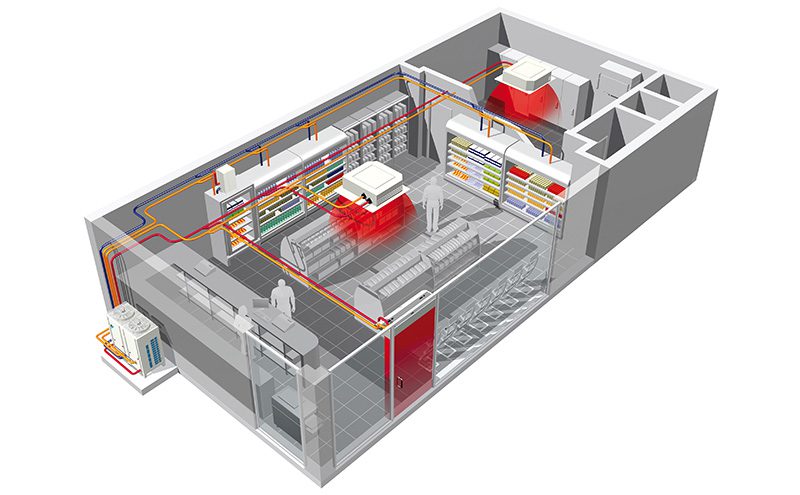Paul Cornwell, refrigeration solutions specialist at Daikin UK considers energy integration
In Scotland there are more than 5,500 convenience stores providing chilled and frozen food along with confectionry and other items. One of the most expensive aspects of running a store is the cost of refrigeration, which accounts for almost half of a retailer’s energy bill.
 This is often of most importance to small supermarkets, and convenience stores in particular, who offer a large range of products in a relatively small physical space that require varying temperature requirements. For example, sandwiches need to be stored at 4˚C, while drinks are usually kept around 6˚C, alongside frozen items that should be kept at approximately -18˚C. Due to typical refrigeration systems preserving a chilled cabinet’s temperature by switching the compressor on and off, maintaining cabinets with varying temperatures can be costly and can lead to food stock freezing and spoiling, adding additional expenses to day-today running.
This is often of most importance to small supermarkets, and convenience stores in particular, who offer a large range of products in a relatively small physical space that require varying temperature requirements. For example, sandwiches need to be stored at 4˚C, while drinks are usually kept around 6˚C, alongside frozen items that should be kept at approximately -18˚C. Due to typical refrigeration systems preserving a chilled cabinet’s temperature by switching the compressor on and off, maintaining cabinets with varying temperatures can be costly and can lead to food stock freezing and spoiling, adding additional expenses to day-today running.
Maintaining a constant chilled cabinet temperature is therefore advisable, as it removes any potential fluctuation, reduces the risk of food products spoiling, and consumes less electricity.
In addition, providing the ideal shopping environment for customers is paramount, with in-store temperatures known to impact consumer behaviour. It is therefore unsurprising that most stores have both heating and air conditioning systems to account for seasonal change to ensure an ambient shopping environment.
Utilising an innovative inverter operated system, combining heating, air conditioning and refrigeration into one unique solution, can provide significant cost and energy savings throughout a store. One such system is the Daikin Conveni-Pack, which alongside the efficient inverter also offers the added benefit of ‘free heat’ recovery, enabling retailers to save up to 50% of running costs when compared with separate systems.
By encompassing heat recovery technology, the heat rejected from the refrigeration display cases and cold stores – normally expelled into the atmosphere – is redirected back into the building to provide genuinely free heat.
Ideal for convenience stores and small supermarkets, the Daikin Conveni-Pack has a compact footprint and low operating noise (35 dBA at 10m in low noise mode) ensuring use in urban and built up areas.

In addition, the small footprint makes the system suitable for installation in restricted areas such as internal plant-rooms, on the building roof or at the rear of premises.
Combining the systems therefore presents several unique benefits to store owners, including reduced energy consumption, free in-store heat as well as a unit suitable for urban areas.
In fact, the Carbon Trust suggest that a 20% decrease in energy costs can have the same impact on a store’s bottom line as a 5% increase in sales. With the potential to lower energy consumption by up to 50%, the Daikin Conveni-Pack could produce more than a 10% increase on a store’s bottom line.
Demands on convenience stores are continually increasing, with consumers requiring a wider range of products and a comfortable in-store environment all year around. Moreover, as running costs continue to rise, increasing profit margin by reducing day-to-day running costs is vital. The integration of high energy consuming systems, such as air conditioning, heating and refrigeration into one unique efficient solution, with the capacity to provide free heat, is an ideal method of ensuring the best retail environment possible, whilst reducing total energy consumption.










